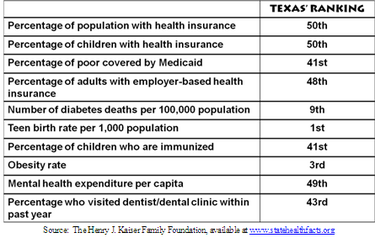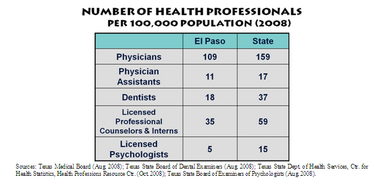"NULLIFICATION OF REALITY"
April 16, 2010
Over his twenty-five years in Texas government, Rick Perry has seceded from reality. Under his leadership, Texas has more uninsured than any other state. From 2000 to 2009, the cost of health insurance premiums for Texas families increased 91.6 percent. Here in El Paso, we have fewer doctors, nurses and dentists than any big city in America. That is Perry’s legacy. We welcome any session, special or regular, to show just how much good the President’s plan will deliver to Texans.
Written by Senator Eliot Shapleigh, www.shapleigh.org

Even before the Patient Protection and Affordable Care Act was signed into law by President Obama, Tea Party activists have been urging Governor Perry to find a way to exempt Texas from federal health reform. More recently, Tea Party activists have been asking Perry to call a special session to pass a "nullification" law. Aside from the fact that such a law would likely be considered unconstitutional and therefore, have no weight, what would be the effects of such a law on Texans? Here are the numerous benefits that any Rick Perry exemption would nullify for Texans:
· 223,000 small businesses could receive tax credits to make premiums affordable. In 2008, only one out of three businesses with fewer than 50 employees offered health insurance. For businesses with fewer than 10 employees, only one out of four offered health insurance.
· 3.3 million low and middle income Texans could qualify for premium credits to help them purchase health coverage.
· Free preventative services for 2.8 million seniors.
· 493,000 seniors in the Medicare Part D “donut hole” would see brand-name prescription drug costs cut in half.
· Currently insured Texans will benefit from consumer protections, including prohibitions on rescission, annual and lifetime caps, and denials based on pre-existing conditions.
· 23,100 Texas primary care doctors will qualify for a 5 to 10 percent incentive bonus payment to address a growing shortage in primary care practitioners.
· 92 percent of all Texans will have access to affordable health coverage. Today, with only 75 percent of Texans being insured, over 6.1 million Texans do not have health coverage. The number of uninsured Texans would decrease by about 4.3 to 4.6 million, and at least 2.5 million of these Texans will have access to health insurance through the private market as a result of these reforms.
· Finally, health reform will deliver substantial, new federal Medicaid dollars to the Texas economy with a 100 percent match until 2017 and no less than a 90 percent match thereafter for new Medicaid enrollees. These new federal dollars will have a 3.25 multiplier effect in the Texas economy.
Given the obvious benefits of federal reform, the next question that one might ask is whether Texas' health care system is working well enough today for most Texans. In other words, do we need reform and the benefits it provides?
After a decade under Rick Perry, Texas is now "the ground zero" of health care in America. Texas has more uninsured than any state in the country. One out of four Texans—over six million—does not have health insurance. Not a single Texas city meets the national average in citizens covered with insurance—not Austin, not Dallas, not Houston. In fact, El Paso has more uninsured by percentage than any large city in the U.S. today. Contrary to the claims of some, even if non-citizens (who include legal residents as well as undocumented immigrants) were removed from the statewide estimate, Texas would still have the highest uninsured rate in the country with well over 4 million uninsured citizens. While the Republican leadership continues to move from the right to the far right, they move further and further from what Texans want. And if any state in the U.S. needs health reform, it’s the Lone Star state.
Consider this: one in six uninsured American children lives in Texas. We have 1.4 million uninsured children, which is more than any other state. Nearly half of these children are eligible currently for Medicaid and CHIP but not enrolled due to inadequate state agency funding.
Let's analyze the "no action option," which has been the history of health care in Texas during the Perry years. As a result of no action, here's where Texas ranks as compared to the other 49 U.S. states:
As you might expect in a state where one in four has no health insurance, health care professionals are in short supply. Texas ranks 46th in physicians per capita (only Idaho, Mississippi, Oklahoma and Utah have fewer physicians) and 47th in nurses per capita. Along the Texas-Mexico border, where I live, fewer doctors and nurses serve us than anywhere else in the United States. The chart below highlights the severe shortage of health professionals in El Paso County:
The truth is that Texas can no longer afford to do nothing. The Robert Wood Johnson Foundation recently released a report compiled by researchers from the Urban Institute who used their Health Insurance Policy Simulation Model to estimate how coverage and cost trends would change between now and 2019 if nothing is done to reform the current system. The report, entitled "The Cost of Failure to Enact Health Reform," shows that within 10 years:
· The number of people without insurance could increase by more than 30 percent in 29 states. As many as 8.3 million Texans would be uninsured, up from 6.1 million this year.
· Businesses would see their premiums increase—more than doubling in 27 states. In Texas, employers' premiums would increase as much as 121 percent.
· Every state would see a smaller share of its population getting health care through their employer. Half of the states would see the number of people with employer-sponsored insurance fall by more than 10 percent.
· Every state would see spending for Medicaid/CHIP rise by more than 75 percent. Texas' Medicaid/CHIP spending would increase as much as 117 percent.
· The average Texan's health care spending would increase as much as 81 percent, with those in middle-class working families impacted the most.
· The amount of uncompensated care in the health system would more than double in 45 states. In Texas, uncompensated care would increase by as much as 138 percent.
Over his twenty-five years in Texas government, Rick Perry has seceded from reality. Under his leadership, Texas has more uninsured than any other state. From 2000 to 2009, the cost of health insurance premiums for Texas families increased 91.6 percent. Here in El Paso, we have fewer doctors, nurses and dentists than any big city in America. That is Perry’s legacy. We welcome any session, special or regular, to show just how much good the President’s plan will deliver to Texans.
![]()
Download this document for more information.
![]()
Download this document for more information.
![]()
![]()
Related Stories

